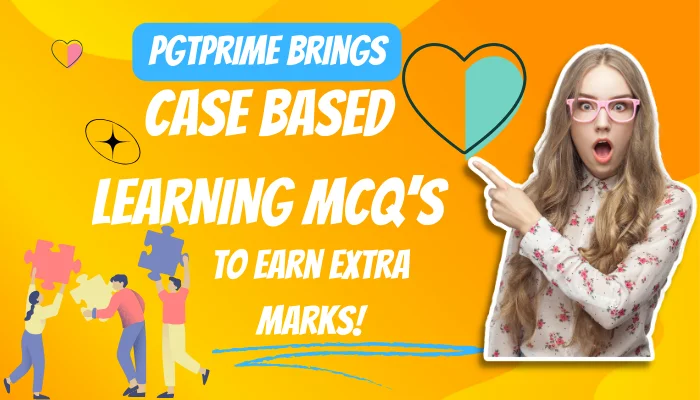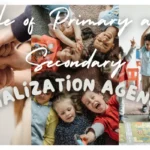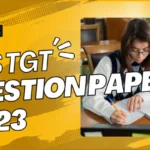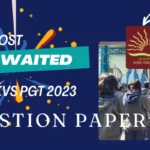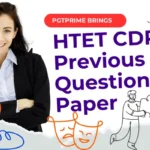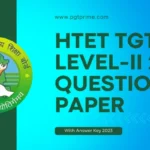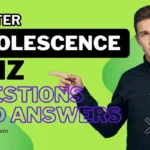Case study MCQ questions encourage students to think critically, consider multiple perspectives, and apply their knowledge to practical situations.
Case study MCQ questions include questions on classroom discipline, Inclusive education, Technology integration, Assessment scenario and design skills, parent-teacher communication, ethical dilemma, and subject-based questions.

Solving a series of Case study MCQ questions is always advisable to fully understand Case study-based learning. This topic is relevant to all aspiring candidates who want to pursue their dream careers as teachers in KVS, NVS, DSSSB, EMRS, CTET, or any other Govt Exams. These Case study MCQ questions help to memorize key highlights that otherwise may be difficult to remember.
Remember, Success is what you make it, not what the world tells you.
A case study that focuses on a specific subject, such as a person, group, place, event, organization, or phenomenon, that is relevant to a particular field of study or discipline. For example, a case study on the impact of COVID-19 on online education would be a subject-related case study for educational research. Conversely, a case study on the marketing strategies of Apple would be a subject-related case study for business research.
A subject-related Case Study MCQ questions can help you to explore, describe, explain, or evaluate a research problem or question from different perspectives.
Case Study MCQ Questions
1. Which of the following are the features of the Case Study method?
- It is inductive.
- It is particularistic.
- It is descriptive.
- It is mechanical.
- (a), (b) & (c) only
- (b), (c) & (d) only
- (a), (c) & (d) only
- (b), (c) & (a) only
Answer: Case Study MCQ Questions
(1) (a), (b) & (c) only
2. Which of the following are true Case Studies?
- Easy to generalize the findings.
- Normally one case for analysis at a time.
- Highly quantitative.
- Integrates different perspectives.
- Adopts the most consequent approach to the particular.
- (a), (b) & (c) only
- (b), (c) & (d) only
- (a), (c) & (d) only
- (b), (d) & (e) only
Answer: Case Study MCQ Questions
(4) (b), (d) & (e) only
3. Cross-cultural studies are an example of:
- Case study.
- Experiential study.
- Comparative study.
- Cross-sectional study.
Answer: Case Study MCQ Questions
(1) Case study.
4. What is a Case Study?
- Studies conducted in areas of genetics and microbiology.
- An in-depth examination of a subject & its related conditions.
- A report on the existing socio-political condition.
- Specialized research in the areas of health and sanitation.
Answer: Case Study MCQ Questions
(2) An in-depth examination of a subject & its related conditions.
5. Which of the following is not a step of the Case Study method?
- Creating hypothesis.
- Preparing a report.
- Observation.
- Imparting knowledge through different steps.
Answer: Case Study MCQ Questions
(4) Imparting knowledge through different steps.
6. While solving a Case Study we should find____________?
- Statement of problems.
- Assumptions.
- Alternate solution.
- All of the above.
Answer: Case Study MCQ Questions
(4) All of the above.
7. Case studies often deliberately focus on unusual,________, or outlying cases which may shed new light on the research problem.
- Neglected.
- Positive.
- Serious.
- All of the above.
Answer: Case Study MCQ Questions
(1) Neglected.
8. Case Study method seeks the active participation of the participants in reaching a___________?
- Problem.
- Findings.
- Solution.
- Research.
Answer: Case Study MCQ Questions
(3) Solution.
9. The case study analysis can be broken down into the following steps. In this which would be the first step?
- Finding a problem.
- Having alternate solutions.
- Writing Assumptions.
- Writing summary.
Answer: Case Study MCQ Questions
(4) Writing summary.
10. A case study refers to the _________ of a particular business problem inside a company or in the current market situation.
- Specification.
- Investigation.
- Narration.
- Presentation.
Answer: Case Study MCQ Questions
(2) Investigation.
Subject related Case Study MCQ questions:
(Social Science)
11. To the altar of revolution, we have brought our youth an incense. Many nationalists thought that the struggle against the British could not be won by non-violence. In 1928, the Hindustan Socialist Republican Army (HSRA) was founded at a meeting in FerozShah Kotla ground in Delhi. Amongst its leaders were Bhagat Singh, Jatin Das, and Ajay Ghosh. In a series of dramatic actions in different parts of India, the HSRA targeted some of the symbols of British power. In April 1929, Bhagat Singh and Batukeshwar Dutt threw a bomb in a legislative assembly. In the same year, there was an attempt to blow up the train that Lord Erwin was traveling in. Bhagat Singh was 23, when he did this and executed by the colonial Govt. During his trial, Bhagat Singh stated that, he did not wish to glorify the cult of the bomb and pistol, but wanted a revolution in a society.
Why Hindustan Socialist Republican Army was Formed? Regarding the above context, infur the appropriate options.
- To fight against the British Colonial rule with the principle of non-violence.
- To fight against British Colonial rule in India.
- To achieve independence for the country through an armed rebellion.
- Both B and C.
Answer: Case Study MCQ Questions
(b) To fight against British Colonial rule in India.
(Science)
12. Gases are highly compressible as compared to Solids and Liquids. The LPG cylinders that we get in our homes for cooking or the oxygen supplied to Hospitals in cylinders are compressed gas. Compressed Natural gas (CNG) is used as fuel these days in vehicles. The Liquid takes up the shape of the container in which they are kept. Liquid flow and change shape, so they are not rigid but can be called fluid. Solids and Liquids can diffuse into Liquids. The rate of diffusion of Liquid is greater than Solid.
Why CNG is used as fuel these days in Vehicles?
- Due to its high compressibility.
- Transported easily.
- Large volumes of gas can be compressed in small cylinders.
- All of the above.
Answer: Case Study MCQ Questions
(d) All of the above.
(Maths)
13. A woman wants to organize her birthday party. She was happy on her birthday but there was a problem she did not want to serve fast food to her guests because she is highly health conscience. She has 15 apples and 50 bananas at home and decided to serve them. She did not want to discriminate amongst guests, so decided to distribute equally among all. Based on the above information answer the following questions.
What is the maximum number of guests she can invite?
- 6
- 5
- 3
- 4
Answer: Case Study MCQ Questions
(2) 5
14. Ramesh class 11th student shows exceptional skills in his academic studies and seems to enjoy reading books during his free time more than interacting with his classmates what can we deduce from Ramesh’s behaviour?
- Antisocial.
- Intelligent.
- Introvert.
- Uninterested in the group.
Answer: Case Study MCQ Questions
(3) Introvert.
15. Naina a 10-year-old girl acts on her impulses without thinking of the consequences, frequently interrupts others during conversations, struggles to wait for her turn and has difficulty following rules. Naina’s impulsive behaviour is causing problems at home and school. which of the following best describes Naina’s behavior?
- Hyperactivity.
- Inattention.
- Impulsivity.
- Aggression.
Answer: Case Study MCQ Questions
(3) Impulsivity.
16. Rajesh belongs to a tribal community and is a 12-year-old student. He struggles to keep up with the rest of the class due to a lack of access to quality education in his village. How can the teacher best support Ramesh’s learning needs in the classroom?
- Label Rajesh as incapable and lower academic expectations for him.
- Assign Rajesh to a remedial class without considering his strengths.
- Provide additional academic support and resources to help Rajesh catch up.
- Ignore Rajesh’s challenge and focus on more academically advanced students.
Answer: Case Study MCQ Questions
(3) Provide additional academic support and resources to help Rajesh catch up.
17. Nisha a 12-year-old girl struggles with word retrieval, has difficulty understanding complex sentences, and often speaks in short phrases. Her parents noticed changes in her language abilities. What is the role of Nisha’s speech-language pathologist in her case?
- Diagnosing stroke.
- Administering medication.
- Assessing language abilities.
- Providing physical therapy.
Answer: Case Study MCQ Questions
(3) Assessing language abilities.
18. A student with an autism spectrum disorder in the classroom is displaying repetitive behaviors like hand flipping, and rocking back and forth. How can the teacher best address this behavior?
- Punish him.
- Redirect his behavior.
- Ignore him.
- Immediately stop his behavior.
Answer: Case Study MCQ Questions
(2) Redirect his behavior.
19. Sofia has been a diligent and high-achieving student lately, She has been overwhelmed and anxious about her upcoming final exam as well as juggling extracurricular activities and responsibilities at home. She finds herself having difficulty concentrating in class and experiencing trouble sleeping at night. Sofia’s friends have noticed that she has become more withdrawn and less willing to participate in school activities. What symptoms suggest that Sofia may be experiencing anxiety & stress?
- Difficulty in concentrating.
- Increase social interaction.
- Improved academic performance.
- A sense of calm and relaxation.
Answer: Case Study MCQ Questions
(1) Difficulty in concentrating.
20. Rahul is a 10-year-old student who struggles with reading comprehension. He often takes longer to understand the main ideas in the text and gets overwhelmed by complex vocabulary. What can the teacher do to support Rahul’s reading comprehension?
- Assign complex text.
- Discourage Rahul.
- Provide simple text.
- Ignore Rahul.
Answer: Case Study MCQ Questions
(3) Provide simple text.
21. Ever since Shivam was assigned to present in front of his classmates for a major project. He has been experiencing restlessness, difficulty concentrating, and even occasional trembling symptoms. Premier League seems to revolve around the upcoming event which type of anxiety could Shivam be experiencing?
- Performance anxiety.
- Generalized anxiety.
- Selective mutism.
- Separation anxiety.
Answer: Case Study MCQ Questions
(1) Performance anxiety.
22. Aman a 5-year-old boy started stuttering a few months ago. His parents have noticed that his disfluency varies throughout the day, and is more pronounced when he is tired, angry, nervous, or feeling stressed. Which type of stuttering is Aman likely to experience?
- Developmental.
- Neurogenic.
- Psychogenic.
- Situational.
Answer: Case Study MCQ Questions
(4) Situational.
23. Kirti is a 7-year-old girl attending a family wedding. Parents have noticed that she often struggles to stay focused and engaged during the wedding ceremony and reception. Kirti frequently gets easily distracted by the decorations, music, and other activities happening around her. She has difficulty sitting still and often wanders off to focus during the wedding. what problem Kirti is facing?
- Excessive talking.
- Difficulty in following instructions.
- Fear of large crowds.
- Aggressive behavior.
Answer: Case Study MCQ Questions
(3) Fear of large crowds.
24. Sanjay is a 16-year-old student who is often perceived as distant or aloof by his peers. He enjoys spending time with a few close friends but is reserved with others. How can the teacher best support Sanjay’s social interaction in the classroom?
- Label as introvert.
- Assign him to lead the group.
- Encourage him.
- Ignore him.
Answer: Case Study MCQ Questions
(3) Encourage him.
25. Kapil is a 10-year-old student who consistently struggles with math concepts. He takes longer to understand and apply mathematical operations and has been consistently performing low. What action can the teacher take to identify, if Kapil is a slow learner in math?
- Compare his grades.
- Label as slow learner.
- Assess his math abilities.
- Talk to parents.
Answer: Case Study MCQ Questions
(3) Assess his math abilities.
26. A Case in any Educational field gives an account of____________.
- Interpersonal problem.
- Personal problem.
- Management problem.
- Social events in the organization.
Answer: Case Study MCQ Questions
(3) Management problem.
27. Cases dealing with an organization’s Experiences and Efforts to solve problems are described as:
- Organisational cases.
- Factual cases.
- Functional cases.
- Theoretical cases.
Answer: Case Study MCQ Questions
(2) Factual cases.
28. All Case Studies involve documentation of the process of:
- Strategies decision making.
- Evaluating a problem.
- Storytelling.
- Exploring choices.
Answer: Case Study MCQ Questions
(1) Strategies decision making
29. In a Case Study, the executive summary is placed as:
- As a part of the introduction.
- At the beginning.
- At the end.
- With the recommendation.
Answer: Case Study MCQ Questions
(2) At the beginning.
30. The first requirement for being able to write an analysis of a theoretical case is a thorough knowledge of the concerned___________?
- Methodology.
- Case.
- Subject.
- Objectives.
Answer: Case Study MCQ Questions
(3) Subject.
31. When is the use of Case Study based learning most effective?
- When the students lack prior knowledge.
- When the outcomes are unrelated to real-world issues.
- When the students are self-motivated and can learn with minimal assistance.
- When the students need constant supervision.
Answer: Case Study MCQ Questions
(3) When the students are self-motivated and can learn with minimal assistance.
32. What is the primary purpose of an Illustrative case study in Case study-based learning?
- To challenge a universal or generalized belief.
- To make the unfamiliar familiar and give readers a common language about the topic.
- To pull together information for several events or situations.
- To explore how or why a phenomenon occurs.
Answer: Case Study MCQ Questions
(2) To make the unfamiliar familiar and give readers a common language about the topic.
33. Which type of case study in Case study-based learning is designed to examine situations of unique interest or to challenge a universal or generalized belief?
- Exploratory case study.
- Cumulative case study.
- Critical Instance case study.
- Explanatory case study.
Answer: Case Study MCQ Questions
(3) Critical Instance case study.
34. Which type of case study in Case study-based learning is only the beginning of an investigation and is used to suggest why further investigations are needed?
- Exploratory case study.
- Explanatory case study.
- Critical Instance case study.
- Illustrative case study.
Answer: Case Study MCQ Questions
(1) Exploratory case study.
35. Which of the following statements best describes the difference between case-based learning and problem-based learning?
- Case-based learning and problem-based learning are the same.
- Case-based learning uses an open inquiry method, while problem-based learning uses a guided inquiry method.
- Case-based learning uses a guided inquiry method, while problem-based learning uses an open inquiry method.
- Both case-based learning and problem-based learning do not involve any inquiry method.
Answer: Case Study MCQ Questions
(3) Case-based learning uses a guided inquiry method, while problem-based learning uses an open inquiry method.
Please let us know through the comment section if you want any topic to be discussed in this blog. We will try to provide an article on that subject as early as possible.
Please leave your valuable comment in the comment box! Your comments are valuable to us.
